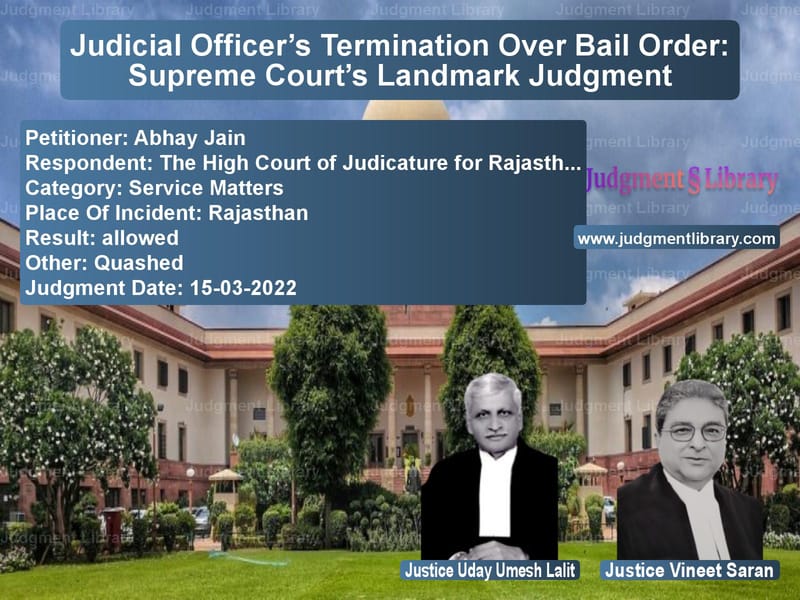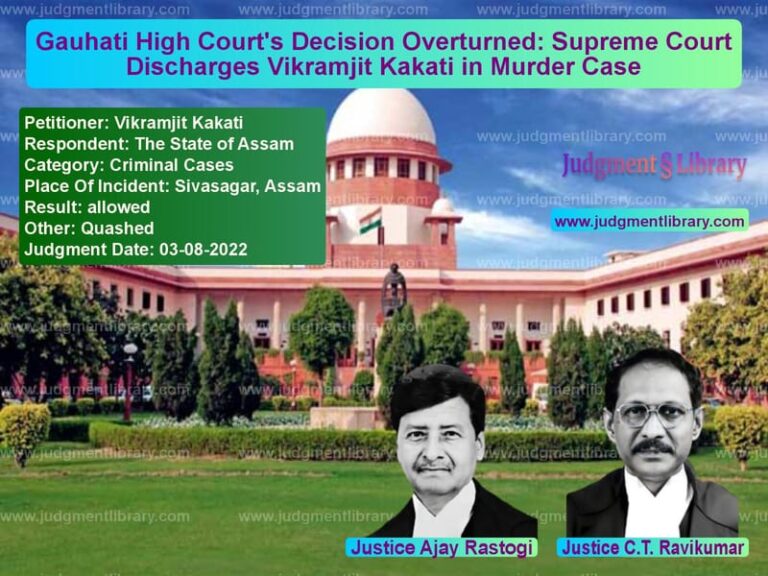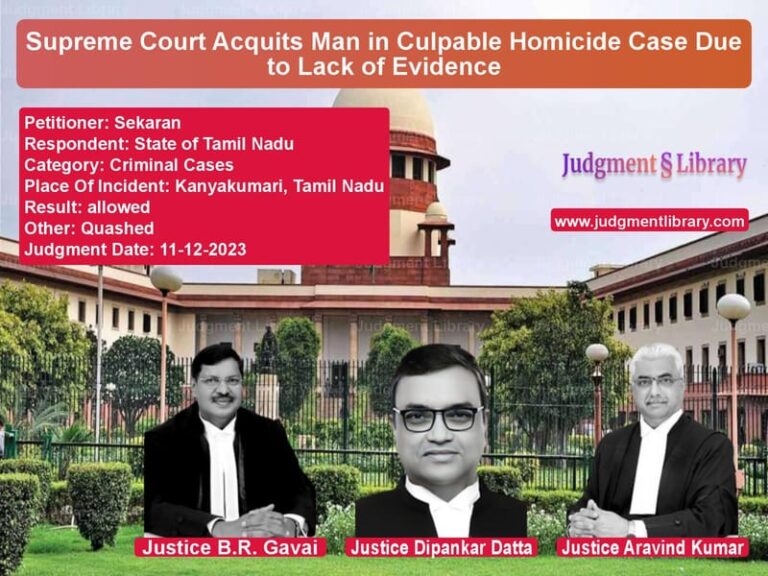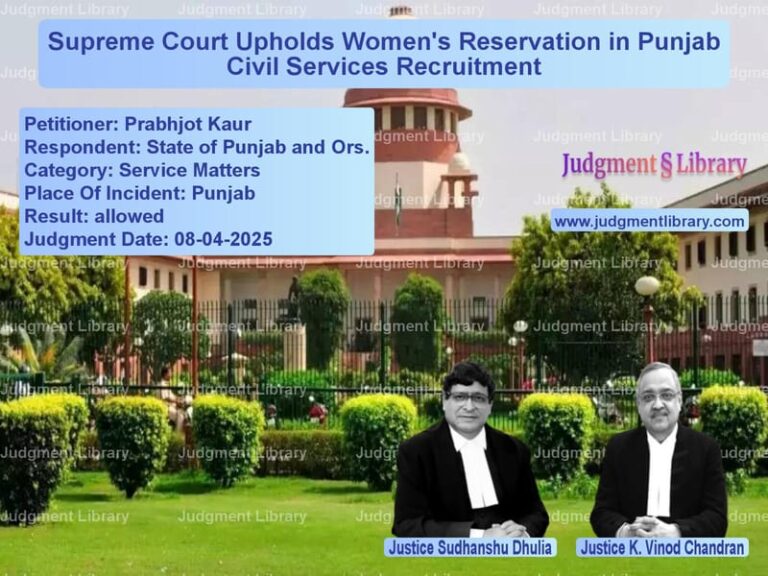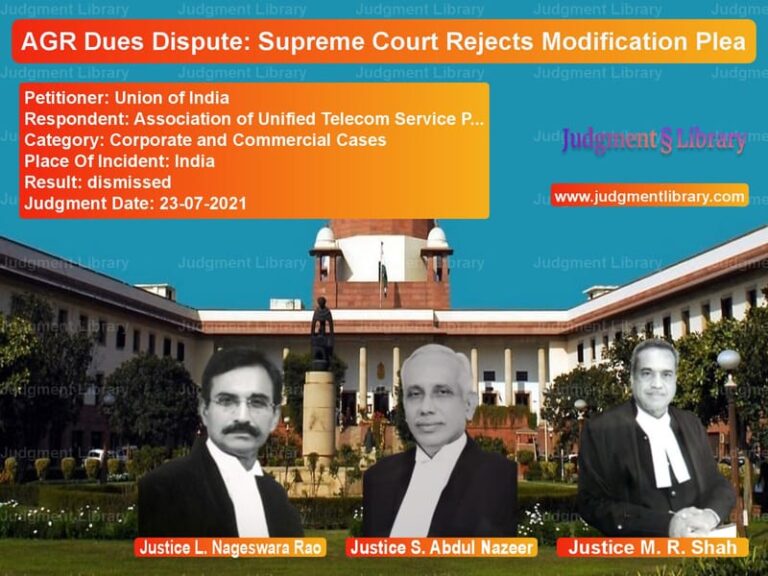Judicial Officer’s Termination Over Bail Order: Supreme Court’s Landmark Judgment
The Supreme Court of India recently adjudicated on a pivotal case concerning the termination of a judicial officer, Abhay Jain, over allegations of misconduct stemming from a bail order he passed. The case, Abhay Jain v. The High Court of Judicature for Rajasthan & Anr., revolved around whether the officer’s discharge was a routine non-confirmation of service or a punitive action influenced by an inquiry into his conduct.
The appellant, Abhay Jain, had joined the judicial services in 2013 and was removed in 2016. His dismissal was challenged in the Rajasthan High Court, which upheld the decision of the administrative body. Seeking justice, Jain filed an appeal before the Supreme Court, arguing that his termination violated Article 311(2) of the Constitution and was not a mere discharge simpliciter.
Background of the Case
Abhay Jain, after securing the first rank in the Rajasthan Judicial Services Examination, was appointed as an Additional District Judge in July 2013. As per the Rajasthan Judicial Services (RJS) Rules, he was placed on probation for two years. During his tenure, he was assigned various judicial responsibilities, including serving as a Sessions Judge in the Anti-Corruption Department in Bharatpur.
The controversy arose when Jain granted bail to an accused, K.K. Jalia, on 27th April 2015, in a case involving charges under the Prevention of Corruption Act, 1988. The accused, a municipal chairman, had been arrested for allegedly accepting a bribe. Jain’s bail order became the subject of scrutiny, particularly because the Rajasthan High Court had earlier rejected the accused’s bail application on 11th March 2015.
Petitioner’s Arguments
Jain’s counsel, Senior Advocate P.S. Patwalia, presented a detailed argument before the Supreme Court, contending that:
- The discharge order was not based on his overall service performance but solely on the bail order he had passed.
- There were no previous adverse remarks in his Annual Confidential Reports (ACRs) until the inquiry began.
- The Rajasthan High Court’s decision to terminate him was influenced by the disciplinary inquiry, which itself was flawed.
- No proper opportunity was given to Jain to explain his decision before his removal.
- The bail order in question was never challenged in any court or reviewed by the state.
- There was no verifiable complaint against him.
Respondent’s Defense
The Rajasthan High Court, represented by Senior Advocate Vijay Hansaria, defended the decision, arguing that:
- The termination was a simple discharge under Rule 46 of the RJS Rules, based on an overall assessment of Jain’s performance.
- The bail order displayed serious lapses in judicial prudence, as it disregarded the High Court’s prior decision rejecting bail.
- The appellant failed to consider material evidence and legal precedents before granting bail.
- The High Court was within its rights to conclude that Jain was unfit for judicial service.
Supreme Court’s Observations
The Supreme Court examined whether the termination was punitive or a simple case of non-confirmation. It scrutinized Jain’s entire service record and concluded that:
- The primary basis of the termination was the disciplinary inquiry related to the bail order.
- The appellant’s ACRs were positive before the inquiry, with no previous remarks questioning his integrity.
- The Higher Judicial Committee recommended his discharge primarily based on the bail order controversy.
- The Full Court’s decision was influenced by a pending disciplinary proceeding.
- The discharge order violated Article 311(2) as it effectively imposed a penalty without due process.
Supreme Court’s Verdict
The Supreme Court ruled in favor of Jain, holding that:
“The termination of the appellant was not a discharge simpliciter. It was a punitive action influenced by an ongoing disciplinary inquiry. The High Court erred in failing to provide adequate justification for the dismissal.”
The Court relied on landmark precedents, including State of Bihar v. Gopi Kishore Prasad and Ishwar Chand Jain v. High Court of Punjab & Haryana, which establish that a probationary officer’s termination must be based on valid service assessments, not on isolated incidents.
Key Takeaways from the Judgment
- Judicial officers cannot be removed arbitrarily: The Supreme Court emphasized that termination must be based on an officer’s overall service record.
- Disciplinary proceedings must follow due process: If a disciplinary proceeding influences a termination, the affected officer must be given a fair opportunity to defend themselves.
- A single bail order cannot justify dismissal: The Court ruled that unless a pattern of misconduct is established, an isolated decision should not lead to punitive action.
- Natural justice principles must be upheld: The lack of prior communication about unsatisfactory performance made the discharge order legally unsustainable.
Final Decision
The Supreme Court quashed the discharge order and directed that Jain be reinstated with all consequential benefits, including continuity of service and seniority. However, considering his non-working period, the Court awarded him 50% back wages.
Conclusion
This ruling serves as an important precedent for judicial officers facing disciplinary actions. It reinforces the principle that probationary officers are entitled to fair assessments and cannot be dismissed solely based on an isolated incident, particularly when their overall record is satisfactory.
Petitioner Name: Abhay Jain.Respondent Name: The High Court of Judicature for Rajasthan & Anr..Judgment By: Justice Uday Umesh Lalit, Justice Vineet Saran.Place Of Incident: Rajasthan.Judgment Date: 15-03-2022.
Don’t miss out on the full details! Download the complete judgment in PDF format below and gain valuable insights instantly!
Download Judgment: abhay-jain-vs-the-high-court-of-ju-supreme-court-of-india-judgment-dated-15-03-2022.pdf
Directly Download Judgment: Directly download this Judgment
See all petitions in Termination Cases
See all petitions in Disciplinary Proceedings
See all petitions in Public Sector Employees
See all petitions in Judgment by Uday Umesh Lalit
See all petitions in Judgment by Vineet Saran
See all petitions in allowed
See all petitions in Quashed
See all petitions in supreme court of India judgments March 2022
See all petitions in 2022 judgments
See all posts in Service Matters Category
See all allowed petitions in Service Matters Category
See all Dismissed petitions in Service Matters Category
See all partially allowed petitions in Service Matters Category

